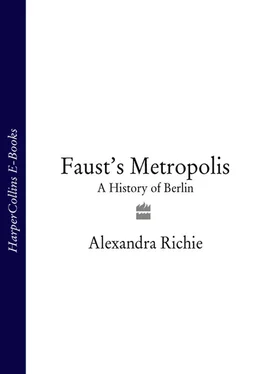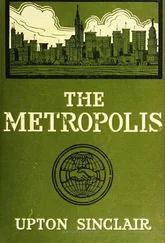1 ...6 7 8 10 11 12 ...30 Germans today have been told to suppress their national ambitions in favour of the European Union, but it is stretching the bounds of credibility to think that united Germans are any more loyal to faceless Brussels bureaucrats than East Germans were to the Soviet representatives of the ‘Communist International’. Germans cannot rely solely on a supra-national identity, or indeed on vague notions of regional identity or Heimat for a stable future; they must accept that they have, and need, a national identity. Stability does not result from the signing of treaties and contracts alone, it also comes from the creation of a culture which people actually believe in. The Utopian visions and political Romanticism of Berlin’s past have caused chaos; the dreamy environmentalists, the radical relativists of 1968, the neo-Nazis, the self-pitying ex-Communists of the GDR, the anti-American ‘1989 generation’ and the New Right who want so desperately to forget the terrible lessons of Germany’s history all pose their own kind of danger. The only way to prevent these, or indeed some other radical force from taking hold in the new Germany is to stop pretending that Brussels is a substitute for history, and to create a national framework in which the vast majority of people can find some measure of financial, political and spiritual security, in short, to form a nation which its citizens believe in and want to protect. The surest way to prevent radicalism in a future Berlin is to nurture and support the capital as the seat of a sound, stable, democratic government which will reflect the values espoused by Bonn, values which were so clearly rejected by the GDR’s Berlin. Helmut Kohl’s notion that without European integration or the single currency there will be another war is bizarre; it implies that he does not really trust his own citizens or the democracy of which they are now so rightly proud.
If Berlin may eventually re-evaluate its dependence on the European Union the same is true of its ties with the east. Berlin will always be involved in central Europe but there is still a danger of falling back into the old stereotypes and prejudices which lie deep in German culture. Eminent politicians, journalists and academics continue to justify Germany’s violent past by calling it the vulnerable ‘ Land der Mitte ’, ignoring the fact that other countries in ‘the middle’ have avoided such a fate. They speak of ‘ Polnische Wirtschaft ’, dismissing Poles as incapable of working to ‘higher’ German standards despite the fact that the Polish economy grew faster than any other in Europe in the 1990s. 50Lingering resentments resurface against Poles and Czechs for the loss of the eastern territories with no thought as to how they came to be lost in the first place, and countries like Ukraine are referred to as mere ‘buffer states’ between possibly troublesome Russia and the west. Berliners tactlessly proclaim themselves the ‘capital of central Europe’. As Adam Krzeminski, the editor of the Polish weekly Polityka , has pointed out: ‘In Vilna they will tell you that you are in the very centre of Europe, in Ukraine they will take you to the Carpathians and show you a granite phallus erected by the Habsburgs. It has a German inscription which states that this is the centre of Europe. In Bohemia you will hear that the centre is near Prague and in Poland that it is near Lódz.’ Berliners are still extraordinarily ignorant about countries to the east; as the novelist Hans Magnus Enzensberger has put it, some members in the Berlin Senate clearly do not possess a map of Europe as they ‘persist in their belief that Milan is closer to Berlin than Warsaw’. 51The new relationships between these countries are still very fragile, as witnessed by the ugly accusations hurled between Germany, the Czech Republic and Poland across the Oder during the terrible floods of 1997. Berlin will not counter the historic fears about Germany – particularly the accusation that it is achieving with the chequebook what it failed to do with tanks; or, put another way, that it is pursuing Hitler’s ends by peaceful means – merely by declaring that it has changed or by explaining that it has only good intentions. Only time and experience will show that it is worthy of the trust of other nations. Nothing in central Europe can be taken for granted.
This blinkered vision of central Europe also extends further east – to Russia. Germany has consistently been brought to the brink of tragedy because it was seduced by Russian power, by Russian strength, even by the Russian ‘soul’. From Frederick the Great to Bismarck, from Weimar to Rapallo and from the Ribbentrop – Molotov Pact to Ostpolitik , Berlin’s foreign policy has too often been based on the notion that its ties with Russia are more important than its ties with the little countries in between; indeed, central Europeans are said by some Germans to be suffering from what they consider to be an irrational ‘Rapallo complex’. But the failing has persisted over the centuries. Berlin now claims that it has always acted as a ‘bridge between east and west’; in reality it has often been a bridge between ‘east and east’, between autocratic Berlin and autocratic Russia over territory conveniently divided between the two great powers; countries like Poland and Czechoslovakia have traditionally been more western oriented than Prussia. As Henry Kissinger put it with reference to West Germany’s attempt to establish links with Moscow in the early 1970s, ‘A free-wheeling, powerful Germany trying to maneuver between East and West, whatever its ideology, [poses] the classic challenge to the equilibrium for Europe.’ 52Berlin has always experienced short-term gains when allying itself with Russia at the expense of these central European nations, but in the long term the relationship has proved dangerous indeed.
At the moment, however, such dilemmas seem far away. Russia is stable and Berlin will no doubt continue to improve relations with Moscow as well as with Warsaw, Prague, Budapest, Kiev and other capitals, keen, as one recent article put it, to ‘prepare itself to become the third centre of world politics after Washington and Moscow’. 53The city has inherited one of the most enviable legacies imaginable. It is at the helm of a peaceful democracy. It is a close ally of the Americans and NATO, and of the countries of the European Union; it is on good terms with Russia and on better terms with central European countries like Poland than it has been for centuries. It is difficult to think of anything else Bonn could have done to give the new German capital a more positive start. But if Berlin’s history tells us anything it is that the future is unpredictable. Problems never resurface in the form one expects, but they resurface nevertheless. Berlin could not have been more prosperous or apparently stable in 1900, but a mere fourteen years later it was shattered by the First World War. A century before that Europe seemed unassailable, only to find itself convulsed by the French Revolution and the Napoleonic Wars. The fact that German unification was achieved without violence was a political miracle, but experience shows that disruption often emerges later and in unexpected ways. A closer look beneath the positive slogans and forced optimism surrounding the new ‘Berlin Republic’ reveals an unsettled, insecure Germany which is undergoing a crisis of identity. Les incertitudes allemandes have in the past tended to lead Germans into a strange, inward-looking Romanticism. One way of trying to guess at the future, and above all to learn from the mistakes made by others, is to study the past.
Berlin is a city of myth, of legend, and of the deliberate manipulation of history. Some myths have become integral parts of the city’s identity, like the notion of the ‘true Berliner’ who, according to a typical 1990s handbook, is ‘loud and jovial, cheeky and insolent, sentimental and crude, unstyled and indulgent’. This ‘character’ is in fact a nineteenth-century creation. Another local stereotype is the notion of ‘ Berliner Unwille ’, which claims that Berliners have always been defiant, politically independent people who resisted their rulers. This particular myth was popularized by the democratic historian Adolph Streckfuss, who reminded Berliners of a long-forgotten medieval skirmish against an early ruler in an attempt to motivate them to rise up and demand liberal reforms from the Hohenzollern King Frederick William IV. But after the failure of the 1848 revolution they grumbled, complained, met in their coffee houses and wrote pamphlets, and yet did nothing. 54But if Berliner Unwille was a myth Berlin conformity was not; a disappointed Lenin would later say that it was impossible to stage a revolution in a city in which the mob refused to disobey the KEEP OFF THE GRASS signs.
Читать дальше












